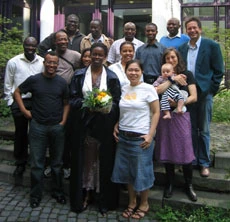Interview with Dr. Dilys Kpongor Sefakor

Ms. Dilys Kpongor Sefakor from Ghana just received her doctoral degree from the Agricultural Faculty of the University of Bonn. Our proud and new doctor did her research on modeling of sorghum production in Ghana under supervision of Prof. Vlek (ZEF) and PD Dr. J. Burkhardt (Institute of Plant Nutrition, University of Bonn). In an interview she relates on her research and experiences at ZEF.
ZEF: Dear Dr. Kpongor, you just finished your PhD study at ZEF. How and when did you come to ZEF?
Dr. Kpongor: I did my Master study in the framework of the ARTS program ("Agricultural Science and Resource Management in the Tropics and Subtropics") at the University of Bonn from 2001 to 2003. During that period I frequently visited ZEF to attend public lectures. Also, one of my supervisors was at ZEF, as well as a number of Ghanaian students doing their research there. From these interactions, I admired among others the international working environment. I also appreciated the educational facilities at the disposal of the students as well as the expertise of the researchers. So immediately after completing my Master in Agriculture at Bonn University, I joined the PhD program at ZEF, starting in October 2003.
On which topic did you do your PhD research?
I did my thesis on land use in West Africa. The title of my thesis was "Spatially explicit modeling of sorghum production on complex terrain of a semi-arid region in Ghana using the model APSIM". The latter means "Agricultural Production System Simulator".
What relevance does the issue have for the development in Ghana?
Sorghum is an important crop and the main food item in Navrongo, a semi-arid region in northern Ghana where I did my field research. Soils in this area are very poor and sorghum production is based on a low input basis. Its cultivation is limited to the home fields were the soils are relatively more fertile. Higher fertility is attributed to the use of animal manure which is the main fertilizer but not readily available. Also, crop residues are harvested from the bush farms and taken away to be used as bio-fuel (e.g. for cooking) and for other domestic use with the waste ending up in the home fields. This has led to a high variation in the amount of soil nutrients within the region: in residential areas with home fields the soil still has a considerable amount of organic matters and soil nutrients. These amounts are decreasing near the bush farms, where the soils are poorer.
So what did you do exactly in your research?
What I did was modeling how sorghum can be grown more sustainable and efficiently. The overall goal is to increase the level of food security in the region and to use soil in a more sustainable way. I developed different scenarios which were simulated with the APSIM model, using variables such as fertilizers and the crop residue management in both home fields and bush farms. Grain yield production was forecasted for 29 years using stochastic weather data, based on a historical record of weather data for the region collected in the GLOWA Volta project. My conclusion was that if the removal of crop residue continues at this level, the quality of the soil in the homestead fields, which are important for sorghum production, will go down to the levels currently prevailing in the bush farms, even with a moderate use of fertilizers. This would have a disastrous effect on the livelihoods and food security of the people in the region in the long run.
In what way is your PhD study contributing to sustainable development in the region?
One of my recommendations is that since future generations will have to cope with the negative consequences of the current practice of farmers, there is a need for government policy interventions. For example in the form of appropriate incentives for farmers to motivate them to use resource conserving technologies, such as returning crop residues to the fields, using cover crops, and producing farm yard manure. Posterity should not pay the price for the current practices of farmers.
What do you consider as the benefits of having done your PhD study in the framework of ZEF's doctoral program?
The interdisciplinary concept gives you the opportunity to get in touch with other disciplines, which was very useful. ZEF also collaborates with renowned international institutions, hence widens the exposure to potential future employers. I was lucky to be a part of the CGIAR Challenge Program on Water and Food (CPW&F) which was executed by the International Crops Research Institute for the Semi-Arid Tropics (ICRISAT). Through this program, I gained a lot of contacts with renowned crop simulation model developers which are very useful to my professional life.
What are your plans now you have finished your doctoral thesis?
I have been offered a post-doctoral position in the GLOWA Volta project as a crop modeller, and am due to attend an interview at the University of Ghana for a position as a Research Scientist with their Agriculture Research Unit in July, 2007.
Dear Ms. Kpongor, we thank you for this interview and wish you all the best for your future private and professional life!

